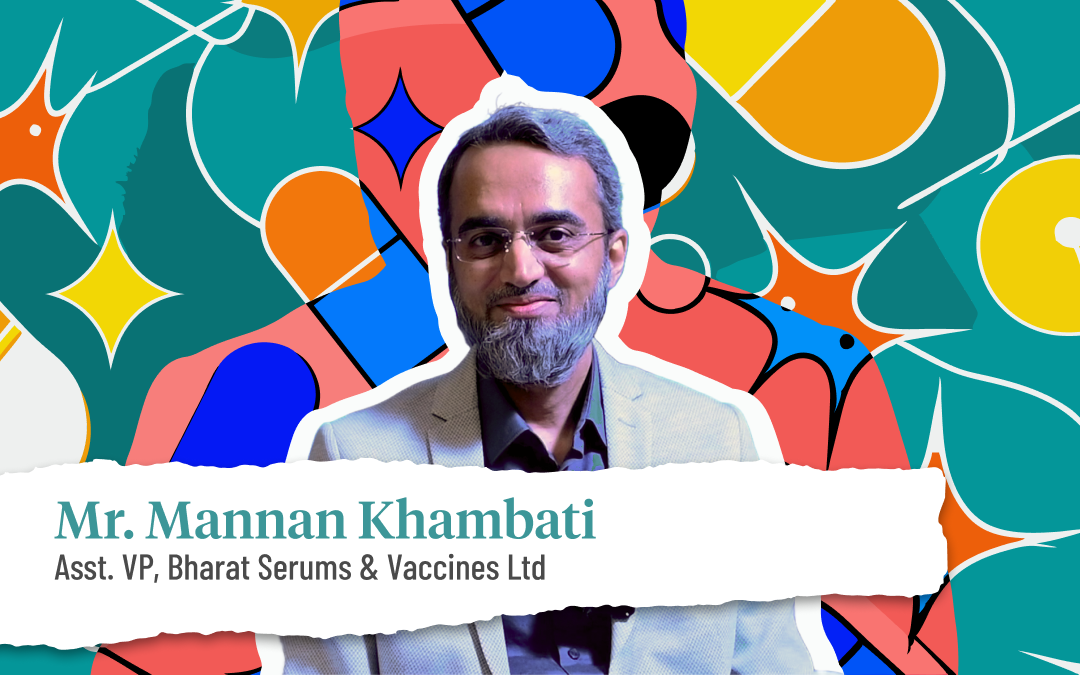QnA
Interview | December 12, 2024
Dr. Ajay Singh is General Manager at the Zydus Group, leading their mRNA platform, cell therapy, gene therapy, antibody engineering, and phage display initiatives. With a rich scientific foundation and multiple years in biotech innovation, he directs strategic development and commercialization efforts across advanced therapeutic modalities. Known for integrating deep technical understanding with business insight, Dr. Singh drives programs that bridge discovery to clinic, positioning Zydus as a key player in emerging modalities and precision medicine.
Pharma Now: Welcome to Pharma Now, Dr. Ajay Singh. Currently, you lead the mRNA department at Gennova Biopharmaceuticals, a subsidiary of Emcure Pharmaceuticals. I heard your recent discussion on mRNA technology, and I was in awe with the incredible innovative solutions you're developing in mRNA, especially an mRNA-based vaccine. Before I ask about your experience and journey, can you tell us what mRNA is and why it is so important after COVID-19?
Dr. Singh: The world has gradually become digital. So, let me explain mRNA in digital terms: mRNA is software that is used to instruct the cell to initiate or create a particular function, and the function is always translated in terms of a protein. We make mRNA in labs, which is an instruction, and then inject it into a cell. This mRNa instructs the cell to create a protein that finally performs a function. This is the most basic explanation of mRNA technology.
Pharma Now: Yes, certainly. That is definitely the simplest explanation of mRNA technology I have ever heard. How did you start working in this technology?
Dr. Singh: I am a trained molecular biologist and biochemist. I completed my PhD from South Campus, Delhi University. I have been associated with Gennova Pharmaceuticals for 12 years. During this period, I have been exposed to different domains and areas. For the last 4-5 years, I have been leading the mRNA department at Gennova Pharmaceuticals. In the mRNA department, we have a lot of functions. We are working on developing vaccines, and we are also involved in translating mRNA or in harnessing its potential for cell and gene therapies.
Pharma Now: Interesting. So, after completing your PhD, did you directly join Gennova Pharmaceuticals? Did your PhD provide you with the knowledge or skills you needed to understand and develop mRNA technology?
Dr. Singh: After my PhD, I worked at South Campus, Delhi University, as a research scientist for almost a year. I worked on antibody engineering and a next-generation sequencing platform. This led me to Gennova. Gennova is short for Genetic Innovation. The company’s motto is to promote technological innovation. So, all our products in the market today are available because of technological innovation.
Gennova has always been driven to innovate technologies, and I appreciate our CEO Dr. Sanjay Singh’s passion for science. He is also a trained scientist, so he understands the pain, luxury, and all the in and outs of science. He always appreciates our work on these cutting-edge technologies, and that's how Gennova came to develop the mRNA platform.
Pharma Now: mRNA is relatively new, but we heard quite a lot about it during COVID-19. How did mRNA impact our vaccines for COVID-19? I know Pfizer’s and Moderna’s COVID-19 vaccines were based on mRNA technology, did we have something like that in India?
Dr. Singh: During COVID-19, India was the only country to launch COVID-19 vaccines using all possible vaccine platforms. So, the live attenuated vaccine was launched by Bharat Biotech, the viral-vector-based vaccine was launched by the Serum Institute of India, a protein-based vaccine was launched by Biological E. and finally mRNA-based vaccine was launched by Gennova Biopharmaceuticals. So, India is the only country to have vaccines from all four platforms of vaccinology.
mRNA is the latest platform for vaccines, and its safety and efficacy have been already proven during COVID-19 because mRNA was the main candidate for controlling the spread of COVID-19 in the wealthier parts of Western countries. So, this technology has a lot of potential.
Pharma Now: Interesting. So, India has launched COVID-19 vaccines on all platforms. However, what sets them apart? How is mRNA technology different from other conventional technologies or platforms for vaccines?
Dr. Singh: In live attenuated virus vaccines, the entire virus is used. But, manufacturing the virus is always a challenge because people working on the shopfloor are always at risk of getting infected. Understanding these challenges, the next platform was developed, which is the protein-based vaccine. In protein-based vaccines, the major challenge is the protein. It is not capable of inducing a sufficient amount of immune response. It needs an adjuvant. Because of this challenge, viral vector vaccines were developed. However, viral vector vaccines have other kinds of difficulties. So, understanding these challenges, mRNa was developed.
mRNA has a lot of potential, and we have made a vaccine using it. We have two Emergency use authorizations (EUAs) granted to vaccines in India, and it has gone through all regulatory approvals. The Department of Biotechnology (DBT) supported us during the development of the vaccine. They provided the seed funding for our first vaccine, whose brand name is GEMCOVAC-19. It is based on the native form of the virus, and the next vaccine we have is GEMCOVAC-OM, which is actually a Omicron-specific heterologous booster.
Pharma Now: You mentioned that Gennova’s mRNA-based vaccine was launched for COVID-19 in India. How did Gennova develop the vaccine?
Dr. Singh: Gennova was never new to the mRNA area. We were working on mRNA since 2017. But, initially, our focus was not on vaccines but toward cancer, for making a new antigen-based personalized cancer vaccine. That’s why we established mRNA. But, during that period, we established all the know-hows and we trained manpower. Having trained manpower was also a challenge because the technology was new. But, we never hired anyone from the outside; instead, we trained our people. So, as of today, almost 80-90% of people or employees at Gennova have contributed at some or another level to the development of mRNA.
During COVID-19, we thought of using this platform for developing mRNA-based COVID-19 vaccines. Our CEO, I would say, was very positive on this take. He always supported us and told us that we have to work in a way that ensured this vaccine went into the market and followed all regulatory norms, compliances and everything. So, we shifted our gear towards COVID-19 vaccines. mRNA was already available to us, so we developed the vaccine.
The major challenge at that time was thermostability because the mRNA vaccine approved by the EUA from Moderna and the BioNTech-Pfizer, require sub-zero storage temperatures.
But, if we had to make a vaccine for India or low- and middle-income countries (LICs) and if we had to maintain the sub-zero storage temperature, the logistics cost would be very high. So, that didn’t make any sense. Hence, we thought of developing a thermostable vaccine. So, we made it finally, and that's how our first vaccine GEMCOVAC-19 was developed.
Pharma Now: I imagine it was a very difficult period for you. We’ve interviewed other people involved in the initial stages of COVID-19 vaccine development, who mentioned they had to work days and nights on end. Did you have a similar experience?
Dr. Singh: Not specific to myself, I would say the entire team involved in this development never stopped for a day during COVID. I mean, we worked day and night. It was really challenging to safely commute from your residence to the workplace and then back because you could be contaminating your family members or societies near you.
I was primarily involved in the designing part. I was involved in how mRNA was designed, how antigens were designed, and the entire designing part. I also helped in selecting the methods used for characterizing mRNA and in the synthesis of mRNA.
Pharma Now: First, let me thank you on behalf of everyone for taking so many efforts to develop the vaccine. I know it was a huge breakthrough, not just for you or the company but for the world. mRNA definitely showed a lot of potential. So, what is the future of the mRNA platform?
Dr. Singh: mRNA technology has a bright future. We have heard many panel discussions and standalone presentations on it, and everybody is using the name mRNA. That’s because everybody understands the potential. There has been a lot of investment in the mRNA field because it holds a lot of potential.
The mRNA platform is not restricted to infectious diseases. People are also trying to use it for cell and gene therapies. It makes sense because it's the next-generation technology, and it can definitely decrease the cost and make therapies economical so that they can be affordable for people from India and LMIC countries.
Pharma Now: Yes, of course, affordability is key. Currently, gene and cell therapies are extremely expensive, and if investing in new tech will bring down costs, it will be for the best. But, as more companies try to start their mRNA divisions, what limitations will they face?
Dr. Singh: First, you need to have the technological know-how. Also, you need to see the Intellectual Property (IP) areas because every company, industry, and developer has protected their mRNA, delivery mechanism and combinations of methods in some or another way. So, you need to look at these areas before entering into the mRNA field.
Pharma Now: Of course, you cannot breach IP rights of competitors to develop products, and this will make getting into mRNA very difficult. But, do you think the Indian pharma industry has the potential to capture this area?
Dr. Singh: Yes, absolutely. In the last couple of years, I have seen almost every Indian industry start investing in this area.
Pharma Now: That's really wonderful, and I'm very positive about it because I think the upcoming years are going to be very important for the Indian pharmaceutical industry. We are already becoming a hub for contract manufacturing and vaccines. So, the next step is innovation.
Dr. Singh: Yes, absolutely. One thing I would like to add here. We have two vaccines in the market, but that doesn't mean we have solved everything related to mRNA. We have a limited team, limited focus and everything. So, everybody cannot focus on every domain or aspect related to mRNA. So, I request my colleagues or scientists across the industry or academia to come forward and work in the area and actually work on untravelled trajectories so that challenges can be addressed.
Pharma Now: That is very important. I think we need to create an ecosystem that is conducive to growth and sharing.
Dr. Singh: Yes. Another good part is that mRNA technology is a platform technology. So, platform technology means that some minimal changes need to be done when we are introducing mRNA to a disease, and the rest remains the same. So, if regulators consider this as a platform technology, the development timeline will certainly be reduced. That's how our Western friends are working, and that's how the variant-specific vaccines from Pfizer and Moderna were approved very quickly.
Pharma Now: Yes, that makes sense. This is definitely something for regulators and Indian scientists to consider. Thank you very much for joining us, Dr. Singh. It was great to have you here.
Dr. Singh: Pleasure, thank you.

FT - Dr. Subhash Thuluva

FT - Ms. Rajni Jha

FT - Mr. Mannan Khambati

FT - Dr. Pratima Srivastava

FT - Dr. Subhash Thuluva
Dr. Subhash Thuluva, Senior VP at Biological E, shares his 25-year journey in clinical development, ...

FT - Ms. Rajni Jha
Ms. Rajni Jha, a seasoned pharmaceutical specialist, shares her journey from the lab to becoming a l...

FT - Mr. Mannan Khambati
Mr. Mannan Khambati, AVP of Biotech Manufacturing at Bharat Serums and Vaccines, shares his inspirin...

FT - Dr. Pratima Srivastava
Dr. Pratima Srivastava, Vice President at Aragen, shares her remarkable journey from aspiring scient...